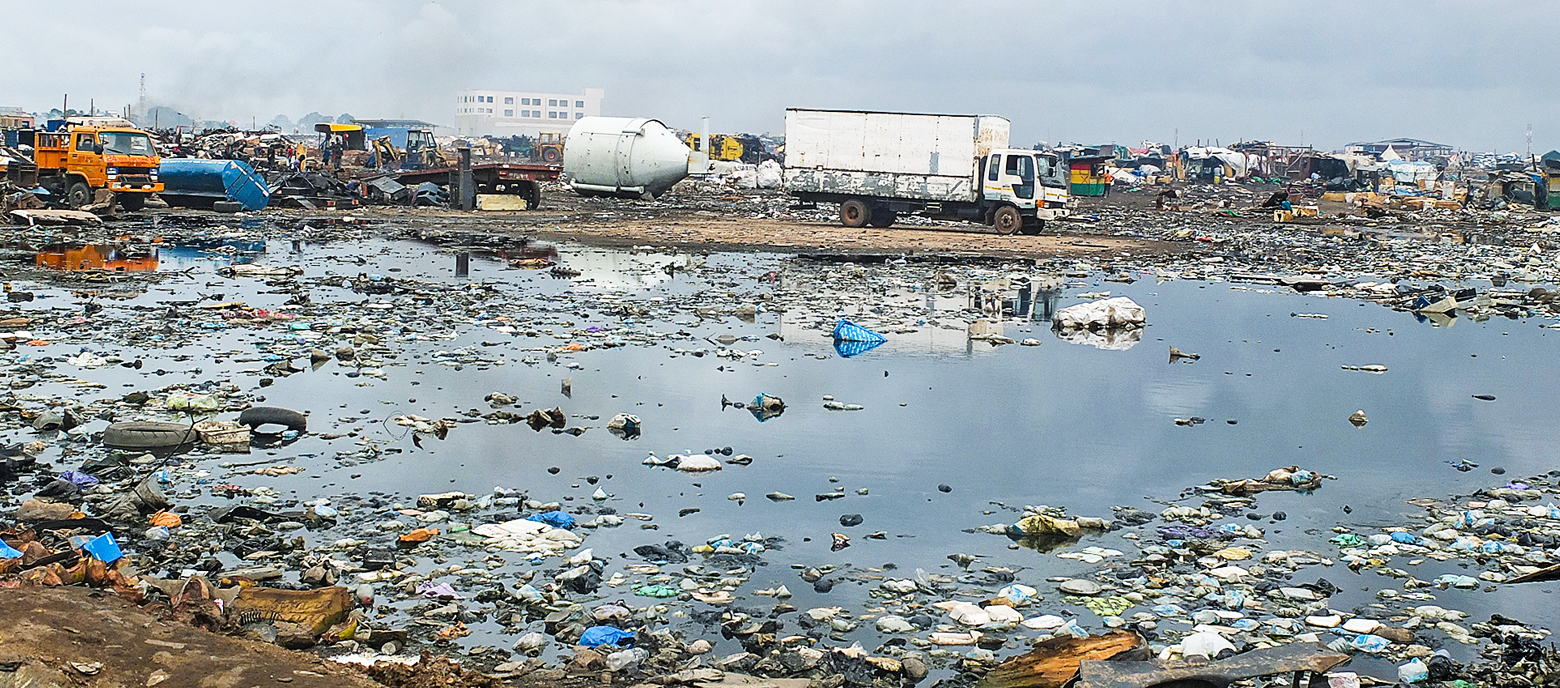In focus: Waste
Kick-off at the scrapyard
’No, don’t do it like that. You could hurt yourself! Let me show you how to do it properly, Mohammed.’ Rabbiu Dazali steps in when he sees his colleague about to smash open a printer using a heavy hammer to get to the valuable metals inside. Young men have been dismantling discarded electrical and electronic equipment (e-waste) in Agbogbloshie for more than 20 years. Located in Ghana’s capital, Accra, Agbogbloshie is considered one of the world’s biggest scrapyards. Old cars and metal parts, intermingled with piles of old mobile phones, monitors, fridges and notebooks, are strewn across the site, which is 15 hectares, or 21 football pitches, in size. The men strip appliances day in, day out.
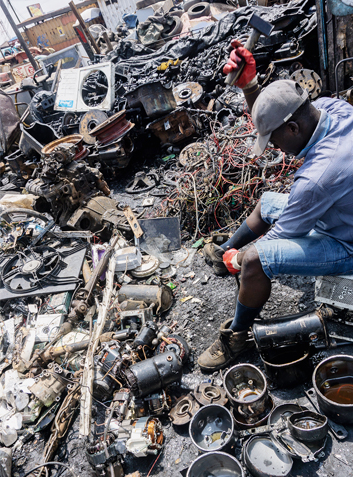
This arduous work is poorly paid, dangerous and makes people ill. It releases toxic substances, such as lead and cadmium, which end up in the air, soil and water. But for many, it is the only way to make money. On average, workers walk away with EUR 155 each month – enough to survive in Ghana. Jobs are thin on the ground, especially for 15 to 24-year-olds. The unemployment rate among young people is around 14 per cent.
‘Mohammed, if you just bash the scrap with your hammer, you might get hit by splinters, and battery acid might damage your skin and pollute the ground. And you’ll also wreck things that we could sell,’ says Rabbiu Dazali, who has been taking appliances apart in Agbogbloshie for years. Like most of the roughly 4,000 men working there, he comes from the poorer north of Ghana. He came to Accra with hopes of a better life and ultimately ended up working at the scrapyard as a dismantler.
Waste contains valuable and toxic materials
To ensure that e-waste in Agbogbloshie is disposed of and recycled using eco-friendly methods in the future, GIZ launched a project in Ghana in 2016 on behalf of the German Federal Ministry for Economic Cooperation and Development (BMZ). The goal is to support Ghana’s Ministry of Environment, Science, Technology and Innovation in improving conditions for sustainable e-waste management and disposal. More and more people are buying televisions, mobile phones and computers in Ghana as well. The West African country imports a lot of second-hand appliances from regions including Europe.
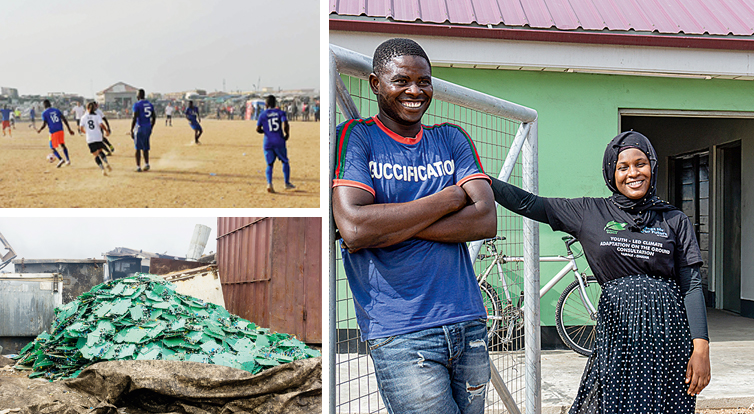
However, an estimated 15 per cent of these appliances are already broken when they enter the country. This imported and ‘home-grown’ scrap – at least 17,000 tonnes each year – ends up in Agbogbloshie. The e-waste contains valuable and scarce resources, such as copper, gold and aluminium, but also toxic substances such as heavy metals and mercury. And yet, at present, Ghana has hardly any environmentally friendly, efficient methods for dismantling, recycling and disposing of this e-waste. Burning cables, for example, produces toxic gases, and greenhouse gases are released if refrigerators are not dismantled properly. Thousands of people earn a living in this environment. In an effort to improve working and living conditions, the GIZ team listened carefully and talked to the workers at the site, most of them men. More than anything, workers wanted medical care and opportunities to learn about advanced recycling. And they really wanted a football pitch. These three wishes became reality in early 2019 when a well-equipped technical training centre and a modern health clinic were opened. And goalposts stand on a field that is now free of rubbish – where lively football matches are played.
‘Workers and scrap dealers suffer from many health problems, such as cuts, skin ailments and respiratory diseases. They can better protect themselves by learning how to employ environmentally sound recycling methods,’ says Professor Julius Fobil from the University of Ghana, who has spent years researching health risks in Agbogbloshie. Since most workers do not have health insurance, they cannot afford to be treated at a hospital or visit the doctor. They don’t even have the money to pay the bus fare to the doctor’s. The health station run by the Ghanaian Ministry of Health will provide workers with low-cost basic health care on-site.
A course for the safe dismantling of e-waste
‘It’s high time that we get better medical treatment,’ says Rabbiu Dazali, recalling the different ways that working at the scrapyard has affected his health. ‘I used to have headaches, skin irritations, back problems, shortness of breath and cuts – but I really had no other option,’ recounts the 39-year-old, who now sells aluminium, copper, brass and spare parts in a small shop in the middle of the scrapyard. Nowadays, younger men like Mohammed dismantle appliances for him. To make sure that his colleagues and friends do not ruin their health carrying out this strenuous work, Dazali joined eight other men and women on a two-month course at the new technical training centre. GIZ experts trained participants in how to teach safe and sustainable dismantling techniques for e-waste. Now he and the other course participants are passing on what they have learned.
Fawzia Mohammed Zuka has also completed this training course. She is employed by a Ghanaian environmental protection organisation and has never worked as a dismantler. At the new training centre, this confident 26-year-old shows workers how to safely extract valuable materials, such as copper, aluminium and gold, from scrap appliances using the right tools and precise movements. This approach is not only more environmentally friendly; it also increases yields. ‘The training course taught me everything that dismantlers need to know and do. Now I can teach them how to protect themselves at work and how to improve their income. That’s exactly what they want to learn, so they take me seriously,’ she explains.
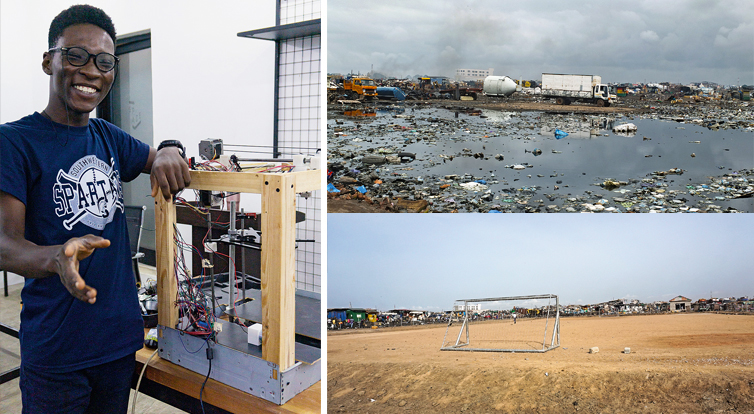
A 3D printer made out of scrapyard parts – for EUR 55!
Sandy Agbottah can often be found at the scrapyard as well. He views this gigantic complex as a treasure trove for electronics rather than as a scrap heap for e-waste. The electrical engineering student bought all of the parts he needed for the first ever 3D printer ‘made in Ghana’ in Agbogbloshie. He paid 320 Ghanaian cedi, just EUR 55, for more than 50 parts. Bought new, they would have cost up to EUR 1,700 – well beyond the student’s budget. He developed his 3D printer, screwed together out of scrap parts, with Impact Hub Accra, which is part of a global network and cooperates with GIZ. Located in more than 50 countries, these impact hubs serve as catalysts to promote local businesses seeking to create added social and environmental value.
‘Until now, we Ghanaians have only been buyers of imported appliances. My dream is that we will become high-tech producers ourselves. And for that to happen, we need 3D printers. They can help people to look at and understand any idea. 3D printers remove barriers to imagination and creativity,’ says the 22-year-old, who wants to go into the world of research after completing his studies. He plans to teach students electrical engineering and organise robotics competitions on the side. In these competitions, teams build robots to carry out specific tasks. In Agbottah’s vision for the future, all of the parts for the robots will be sourced from modern recycling enterprises in Agbogbloshie.
IN FIGURES
Ghana recorded a 6.3 per cent growth in its economy in 2018 – ranking the country as a leader in Africa.
30 million residents
experience significant variations in income between the more prosperous coastal region and the north of the country.
Source: World Bank 2018
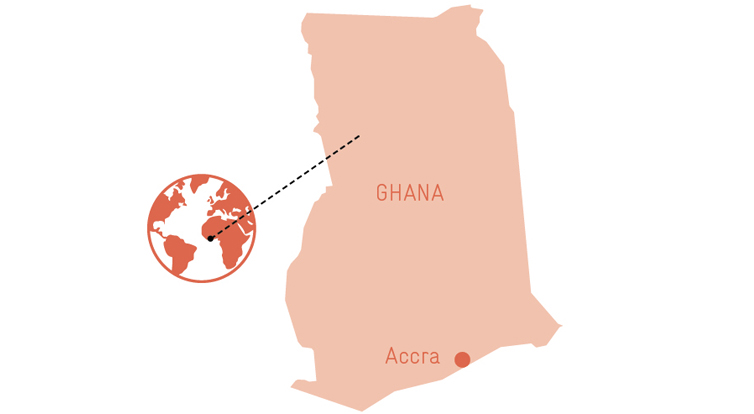
IN WORDS
‘In this pilot project, we are supporting a scrap dump as it undergoes a transformation from the inside out.’
Markus Spitzbart, Head of the E-Waste project in Ghana markus.spitzbart@giz.de
These parts might even come from Rabbiu Dazali’s shop. The shop owner is already seeing significant changes. ‘There is already less cable burning happening here, fewer dismantling injuries and fewer toxins ending up in the environment,’ says Dazali who, like most dismantlers, lives nearby in the Old Fadama slum. He has met a number of journalists from all over the world in the past few years. In their reports, many describe Agbogbloshie as ‘hell on earth’ because of the dangerous working conditions and devastating environmental damage. Dazali hopes that they will return one day to take a fresh look for themselves: ‘Reporters will not recognise Agbogbloshie. It is true that things used to be bad here, really bad even. But a lot is changing now and we can become a real role model for the world when it comes to recycling.’
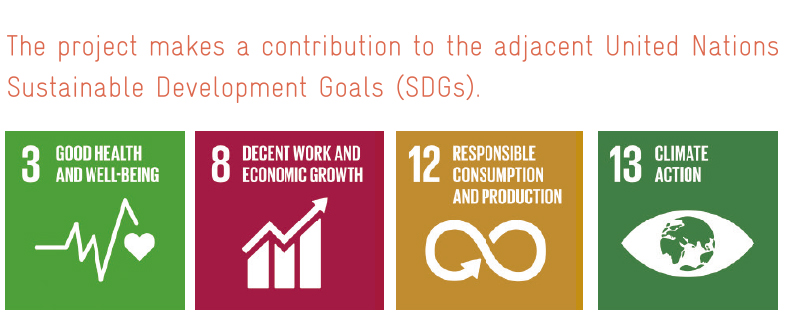
published in akzente 2/19
